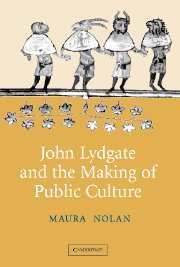Book contents
- Frontmatter
- Contents
- Acknowledgments
- Introduction: the forms of public culture
- 1 Tragic history: Lydgate's Serpent of Division
- 2 Social forms, literary contents: Lydgate's mummings
- 3 Tragedy and comedy: Lydgate's disguisings and public poetry
- 4 Spectacular culture: the Roman triumph
- Bibliography
- Index
- CAMBRIDGE STUDIES IN MEDIEVAL LITERATURE
4 - Spectacular culture: the Roman triumph
Published online by Cambridge University Press: 22 September 2009
- Frontmatter
- Contents
- Acknowledgments
- Introduction: the forms of public culture
- 1 Tragic history: Lydgate's Serpent of Division
- 2 Social forms, literary contents: Lydgate's mummings
- 3 Tragedy and comedy: Lydgate's disguisings and public poetry
- 4 Spectacular culture: the Roman triumph
- Bibliography
- Index
- CAMBRIDGE STUDIES IN MEDIEVAL LITERATURE
Summary
In 1432, having been crowned in both England and France, Henry VI returned to his native soil to take up his reign as an adult. The minority, for which Lydgate had written so much and such varied verse, was officially over, though Henry VI would continue to be carefully supervised as he exercised his royal will. The citizens of London greeted their king with a lavish display as he processed through the streets, and unsurprisingly, one of the most vivid records we have of that occasion is a poem written by Lydgate, titled by MacCracken “Henry VI's Triumphal Entry into London.” The entry itself was one of the most splendid to have been mounted in England, in part as compensation for English losses in France, and in part to reassert the authority of the young king after a protracted absence. Lydgate's poem is a mediated account of the events of the day; most likely written after the fact, it describes in detail the various pageants and tableaux that Henry VI encountered in his procession through London. The poem has attracted a certain amount of critical attention, as scholars have come to recognize that the royal entry was a crucial means by which medieval kings represented themselves to their subjects, a highly ordered and sophisticated cultural practice through which monarchical power was elaborated and constructed.
- Type
- Chapter
- Information
- John Lydgate and the Making of Public Culture , pp. 184 - 255Publisher: Cambridge University PressPrint publication year: 2005



